#similarly with louis' mother's death
Explore tagged Tumblr posts
Note
https://www.tumblr.com/pynkhues/769550440365981696?source=share
OH MY GOD The hair. Do you think there's a universe where they made it look bad on purpose to echo the slight irony (is that the right word) of the scene? <--This is my overly optimistic brain jumping through hoops. Or, perhaps more likely, they just tried the Brad Pitt Hair for a fun homage, saw the results, and decided they were never doing that ever again.
On a related note, I always wonder if Lestat meant to write a 100% earnest love letter, or whether he knew that Louis was planning to kill him. Are the two mutually exclusive? Would he write it any differently if he knew? Writing it to inspire guilt on purpose seems a bit premeditated and cruel for Lestat. Especially considering his love for Louis, his allergy to planning, and the hints both from the show and actor interviews that he was kind of resigned to his own "murder" as a form of atonement. None of the words in the letter actually suggest that it's anything beyond earnest --and murder is one of the only ways Lestat can die, if at all --so I don't think its odd for him to assume that will be the general circumatances of his death, even if he didn't know about Louis' plans yet. Regardless of all of this, I find it likely that Dreamstat's slightly mocking tone is only Louis projecting his own guilt.
Maybe the show writers weren't even thinking in these terms, as much as just "Let's write a letter that's so sweet it will make this scene as devastating as possible." Anyway, I'm curious to know if you have any thoughts on the letter scene!
--🐸🌸(frogbehindthescenes)
It's so bad, oh my god, it looks like they did a blow out and then hair-sprayed it within an inch of its life. I kind of wonder if there was some bad weather happening when they shot that, because Jacob's hair looks really stiff / more gelled down than usual in that scene too (although they did really flatten his hair a lot in the Paris 1940s sequences), so it may have just been about trying to manage continuity. I'm probably grasping at straws there though, haha.
And yeah, I tend to read it as earnest, and the tone to be more about Louis' own guilt and ill-feelings towards Lestat, both in the moment and in the fact that he's telling this story to Daniel when he still thinks Lestat's the one who orchestrated the trial. In a lot of ways, I think it depends on when you think he wrote the letter too? Louis tells us in the voice over that Lestat was frequently getting money wired from Roget & Associates, and the implication seems to be that the firm's been handling Lestat's affairs for likely generations between that and the Coven's meeting with him later in the season. Pierre Roget is pretty well aware of who Louis is too, so the firm likely was involved from Lestat's end in the acquisition of the Fair Play Saloon / The Azaelia for Louis too.
I think it's interesting that Louis imagines Dreamstat there in the suit that he wore to meet his family before he ever even turned Louis, and I don't think we're supposed to infer that the letter was written that early (although it's a very interesting costuming choice linking those two scenes), but I do kind of suspect Lestat wrote it before he knew of Louis and Claudia's plot to kill him? In fact, the lack of any mention of Claudia at all lowkey makes me think he might have written it before they even had her, although I'm not super confident in that.
But yeah, I think it's intended to be earnest and is a part of the show weaving in Lestat's real voice throughout the season, juxtaposing it with the one Louis would give him - especially given Dreamstat in 2.01 was telling him he'd be killing him the second he was happy, and the Lestat of this letter offers only tenderness. What do you think?
#there's actually a lot of moments in s1 that i could see triggering lestat to do it too#like even as early as paul's death and louis' bereavement#i could see lestat feeling it not as a means of planning but a romantic gesture#to reassure louis after his death if he IS to go#similarly with louis' mother's death#but given where they were with claudia at that point i do feel she'd have been mentioned if that was the case#it's interesting to think about!#iwtv 2.02#lestat asks#louis asks#dreamstat#iwtv asks
9 notes
·
View notes
Text
Ok so I just finished rewatching amc’s iwtv pilot for like the bajillionth time and I just want to ramble about the pointe du luc sibling dynamics for a moment.
A lot of people always talk about Louis & Paul, and I understand why coz their time together was short and Paul’s death was very impactful — but for me personally, Louis’ and Grace’s relationship will always hit the most.
You can tell that’s they’re very close and have been since they were children. I love how much louis takes care of her, and similarly I love grace’s #ally behaviour. I mean, it’s 1910 — it’s pretty much illegal to be gay and very looked down upon,,, and I don’t think grace ever knows for sure, but there are some lines that she suggests she guesses it, especially later down the line.
Even as Paul dies, their mother blames Louis, and Louis has distanced himself from the family, Grace still gives Louis the benefit of the doubt and supports him. Lmao when he turns up in those sunnys (which is basically a walk-in ‘I’m gay’ flag according to Florence pointe du luc lol) and talks about Lestat (who Grace clearly doesn’t like very much, as in her perspective he took Louis away from the family) she supports and confides in him.
It isn’t until Louis breaks down her front door and threatens her that she actively stops supporting him. And the grave scene where she shows Louis his gravestone makes me absolutely bawl every time I watch it — because from her viewpoint, both her brothers died that day.
And yes it is frustrating to see Louis self-sabotage this relationship like that but it does make sense. Louis has been in a toxic relationship, has to hide and deal all with all the new turmoil of becoming a vampire and is in a constant state of self-loathing. But Grace doesn’t see that, she sees a brother who abandoned, hurt and threatened her when she needed him most.
I think their relationship is reflective of the types of familial relationship (or rather lack thereof) a lot of queer ppl in that time had, especially queer black folks and poc. And it is written and acted so beautifully I love the writers.
#iwtv#amc iwtv#iwtv louis#amc louis#grace de pointe du lac#interview with the vampire#amc interview with the vampire#their relationship is everything to me#it reminds me a lot of me and my little sisters relationship#got me crying when I typed this up lmao 😭#anyways I love this show
32 notes
·
View notes
Text
IWTV Musings - Claudia & Books
I need to say something wrt how books & Claudia are similarly treated by Louis, Lestat & Armand--weaponized by Louis and against Louis. I wanted to post this separately from the larger topic that was raised here considering to what degree Lestat & Armand should be either praised or censured for their attitudes towards Louis' book-reading.
My argument is that regardless of how Les let Lou read (even at the detriment of their relationship & intimacy when Lou was too depressed to pay attention to Les), his passive/micro-/macro-aggressive behavior towards Lou was still just as disrespectful of Lou's agency & autonomy as Armand's was by keeping the bookshelves out of reach.
What good is being allowed to read, if the very act of reading is constantly ridiculed & derided & judged & insulted? Les calls Lou a "pompous Sorbonne student" who lets scholars "fog his mind." With a husband like that, who needs enemies?
So I just wanted to point out that both books AND Claudia are a means to an end, for all parties involved.
Louis reads books to be respected in society as a man of means.
Black people hadn't even been allowed to read during slavery (x x), but 1-2 generations later, Louis is an extremely literate Black man. His mind is quick & sharp and he's treated as a credit to his race by white pigs who're stunned that Lou's smarter than & can outpace them, and offended when he dodges around their racist AF red tape.
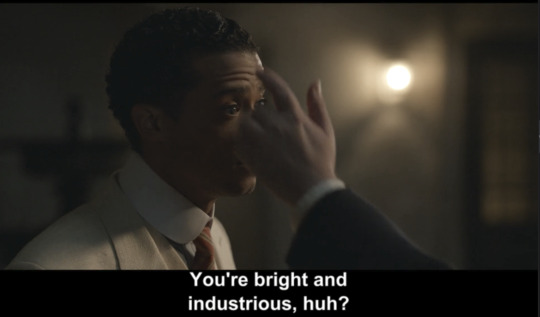
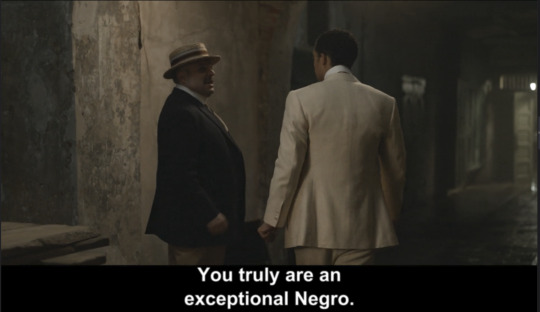
A savvy businessman, Lou's desperate to get ahead in the world; his prime motivation is to be FREE--not have The Man's "boot on my neck;" or treated as a 2nd class citizen to be taken advantage of; or hated for who he is (and the things/people he loves).


The sad irony's that it's Lou's gifts that doom him in the end. Lou's too smart for his own good, and attracts the wrong kind of attention (just like Les was too talented for his own good & attracted Magnus). His avid book-reading further impacts him negatively when books start coming between his relationship with Lestat.
Miserable with being a serial-killing vampire, Louis stops drinking human blood. Weak & starved, he distracts himself from his hunger by reading books--his one comfort as he felt more & more depressed--
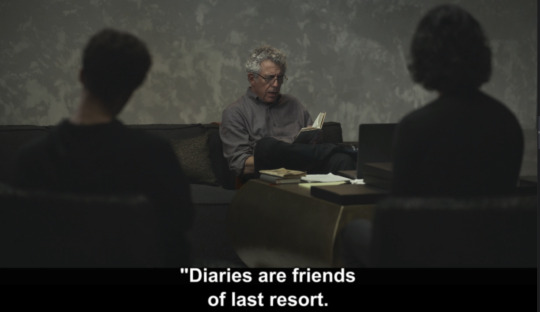
--and esp. as Les started cheating on him. Despite Les' promise to accept an unapologetic Louis, Les made Lou feel unaccepted, "a botched vampire;" "Am I not enough?" Where alcoholic Louis used to run to the bottle to escape his pain, now he escaped in his books.
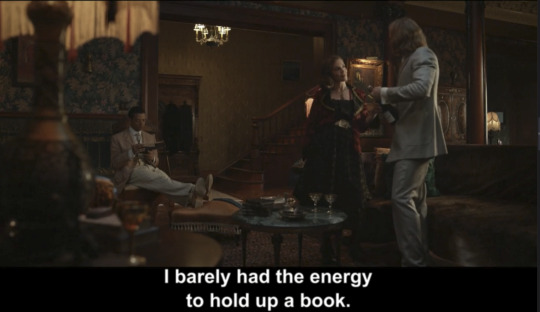
Lou's literacy & libido/vampirism are CONSTANTLY brought into contrast--Louis' choice to stay home reading rather than go out & hunt or have sex--thus rejecting (the lifestyle) Lestat (gave him). We know what that triggers for Lestat (whose negligent & emotionally absent mother Gabrielle also retreated into her books when she was depressed). Louis' books are in the way. But we see Louis read the least in 1x4, once he has Claudia & Loustat's marriage improves.
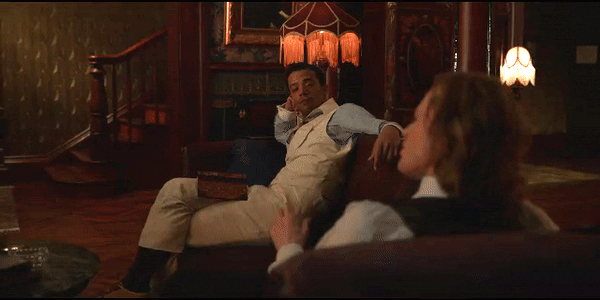
Louis wanted a child to feel like his life was finally worth something to someone.
Claudia's function is best described by Daniel in S1 ("a band-aid for a sh!tty marriage"); and especially by Armand in S2:
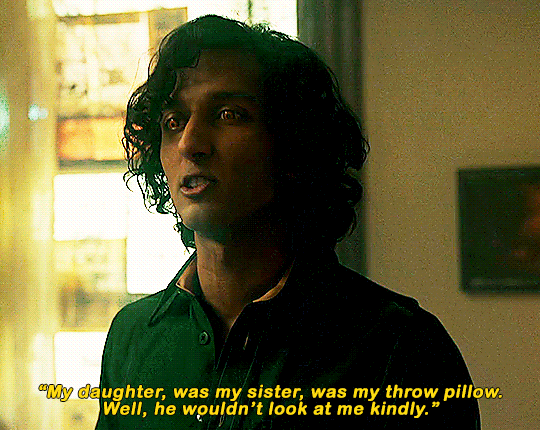
Lou wanted someone to make him feel needed & worthy & valued & good--that he wasn't a failure, literal "dead-weight," an undead vampire whose life & purpose/meaning was over--an ambitious Black man whose business was shut/burned down by the white racists; a gay son/brother whose homophobic family hated him & didn't want him around; and a spouse whose husband refused to respect him by staying around (faithful & at home).
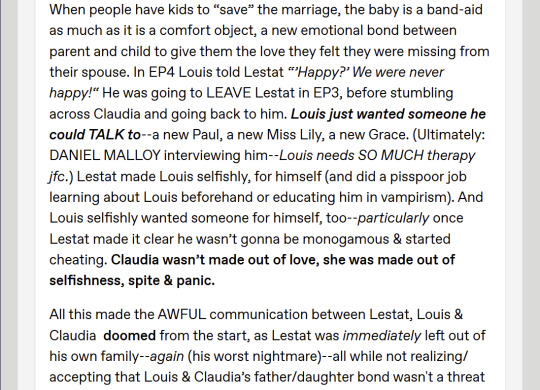
Claudia mistakenly assumed Louis wanted her to replace Grace as Lou's new sister, when really, it was never about Grace (or Claudia), but Louis' dwindling self-worth--esp. since her death/Turning happened the night of the race riots Louis blamed himself for. Claudia was his way of "doing right" by the last remnant of Storyville; But Claudia's just another exploited Black girl of Storyville; treated like a doll Loustat babied & infantalized; the "throw-pillow" making their house a home with light & warmth, a distraction from the emptiness/loneliness Loustat felt. Lestat turned Claudia to make Louis happy & keep Louis with him, and Louis wanted a child so he could have "a family of MY own." Thus: The Unholy Family.

Unfortunately, Claudia increasingly got "in-between" Louis and BOTH of his husbands--she was in the way.
Claudia & Books: In the Way, and Out of the Way
Lestat and Armand treat handle Louis' obsession/preoccupation with books & Claudia in very particular ways.

Les didn't stop Louis from reading his books & hoarding newspapers, or spiraling into depression over Claudia being gone. In a way, he felt powerless, too scared to spook Louis (into leaving/suicide) by doing or saying the wrong thing. Lestat steps back, and lets the dominoes inevitably fall how they may, so he can sit back and say "I told you so; father knows best;" "who was it that she takes after?," always with the last word. Lestat said the books Louis was reading had "fogged" his mind, and wouldn't be enough to help Lou's struggles as a vegan vamp. (Allegedly, he warned Lou before he turned Claudia that she'd be defective.) He stood back and let Louis suffer & learn on his own.

When Claudia ran away, Les stood back & didn't try to stop her (unless that's a S3 scene they'll gotcha! us with). Lou kept insisting that she'd come back, but Les kept insisting that she wouldn't.

Les was incredibly nasty towards Lou's bookreading, and towards Claudia (and her own book-reading). Les didn't want Lou reading books, he wanted Lou to pay attention to him ("light yourself on fire, see if he would notice!"); hunting & killing & orgies. He disrespects Lou's grief as a parent worried about their runaway daughter, more concerned with getting his "considerable considerables" wet than understanding Lou's need to track Claudia down. Even at the effing Trial Les makes it all about him not being allowed to have sex with a mentally ill person nowhere NEAR in the right headspace to be effing around, like wtF?
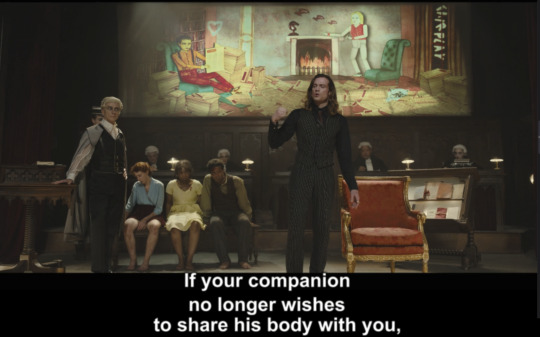
(At least S3 can't Gotcha! itself out of Les' callous behavior, cuz it was written in the script that both Armand had & that Sam gave the Talamasca.)
Les loved that Lou was smart & interesting & knew a bunch about the world cuz he read so many books--until those books became an inconvenient impediment to Les' relationship with Lou.
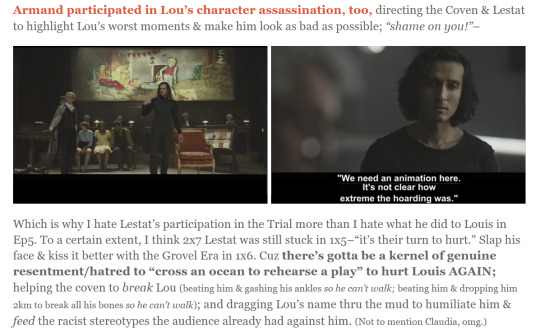
Les loved that Claudia was "a consummate killer, a congenial companion" to BOTH himself AND Louis--until her bond with Lou became an inconvenient impediment to Les' relationship with Lou, ("I can see where this is going!").
(Les' problem is that he doesn't appreciate what he had with Louis & Claudia until they're gone--he insults Lou's avid bookreading while they're together; only to become the most prolific vampire author in the entire TVC, consuming books when he has no one around to teach him about the New World anymore after Lou & Claudia are gone. He treats Claudia like trash, terrorizing her to no end, and then cries that he never treated her like a proper father should've when he had the chance; which further pushed Louis away when his daughter was disrespected, mistreated, and abused--a la Ep5.)
Armand, on the other hand, was NOT gonna be ignored cuz of Louis' books or feel threatened/replaced by Claudia. He'd have it ALL, or NOTHING.

In the script, Armand (rightly) said Lou had "extreme hoarding." The penthouse, however, is very carefully curated, so that it's impossible for Lou to hoard anything without a team of servants cleaning up after him. All the books are neatly stacked & perched far out of reach, so that Louis HAS to ask Armand's permission to read anything--a couple books on the bedside table and that's it--and Armand has the final say on what he reads, just like he did with Claudia's diaries.

Once dead (by Armand & the coven), Claudia is relegated to Lou's memory, and her diaries--another book Lou's not allowed to read (unless he asks nicely), or remember (unless he & Daniel work behind Armand's back). It's unclear what memories Louis allegedly asked Armand to erase, but Armand is busted having inserted false memories/convos/words in Lou's head, and he admits to removing some of Claudia's pages without Louis' awareness & consent; thoroughly abusing Lou's trust & disrespecting the personhood of Lou, Claudia, Lestat, & Daniel.
And this is before he's busted again, having been the one who organized Claudia's murder & instructed Santiago to pass Claudia's diaries around to the audience, violating the privacy of her body of work (a possible parallel for the Frankenstein violation he performs on her physical body in the book).

The ONE person Lou was truly closest to, whose memory was most precious to him ("I had a daughter!"), Louis could not properly remember ("I walked into the sun!")--hence why Lou got so emotional when he remembered that Claudia had dreams/nightmares, and that his memories of her were slowly coming back to him--that Claudia's diaries (i.e.: his most precious books) weren't the only comfort he had left, if he could carry her memory in him.
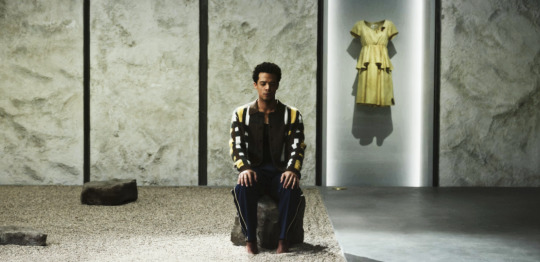
Just like the IWTV book/"memoir" he'd wanted to publish wasn't the real embodiment of his time with Lestat, but actually an Armand-shaped effigy he'd been manipulated into believing was the truth.

#louis de pointe du lac#justice for claudia#interview with the vampire#the vampire armand#lestat de lioncourt#loustat#loumand#iwtv tvc metas
19 notes
·
View notes
Text
"The remarkable thing about [Gerberga of Saxony's] widowhood is that she seems to have carried on exercising her queenly status without open challenge more or less until her death in 969, and without an obvious break when her son reached majority. As well as making regular appearances as petitioner in royal charters, she is also referred to consistently and unproblematically by Flodoard as ‘queen’. In this respect, she was arguably the most politically active royal widow since the late ninth-century Italian empress Engelberga. The fact that Gerberga retained such a high profile should not be taken for granted. The participation of royal widows in the public life of the kingdom was extremely vulnerable to criticism because (unlike kings, who remained kings until death regardless of how many wives predeceased them) they were not automatically categorized as political actors—their roles usually had to be justified and rationalized. Because of the peculiar role of queens in articulating the shape of royal dynasties, widowhood was conceptualized as a specific state onto which various ideologies could be projected. The Ottonians are thought to have developed a distinctive approach to this problem by turning royal widows who played crucial political roles into saints.
[The charter Gerberga issued in 959 for the monastery of Homblière exemplifies her prominent role]. The ‘gratia Dei (by the grace of God)’ clause is particularly striking, implying that her status derived not from a husband or son but, like a king’s, directly from God. In fact, there are very few surviving charters of any kind issued by queens before the twelfth century, a pattern that cannot be dismissed as an accident of survival. Those we have were mostly composed for queens who were, like Gerberga, widows. But in contrast to Gerberga’s case, the status of these queens was carefully framed in reference to the authority of their late husbands, often using the past tense. Thus two charters recording gifts made to the monastery of Gorze in 910 by Richildis, widow of Charles the Bald (840–77), refer to her as ‘former queen’ (‘quondam regina’). Similarly, the testament of Ageltrude, widow of one dead Italian king and mother of another (respectively Guy, 889–94, and Lambert, 894–8), describes her as ‘former empress’ (‘olim imperatrix augusta’) and invokes the authority of both men in claiming her right to dispose of her property. Even the Empress Engelberga, one of the most powerful queens of the ninth century and someone who was able to exercise independent power in Italy after the death of her husband Louis II in 875, shrouded her public persona in this kind of rhetoric. Her testament, which dates from 877, is an impressive statement of her power and connections, but opens by establishing that she was, above all, ‘former wife and august empress of the most pious emperor Louis of blessed memory’, and goes on to emphasize that she was even now acting on his authority. Compare Gerberga’s charter of 959, in which her late husband Louis IV is conspicuous by his absence and it is the queen herself who is rhetorically inserted into the role of ruler.”
— Simon MacLean, Ottonian Queenship
#gerberga of saxony#10th century#french history#historicwomendaily#I personally think that Ageltrude (empress of Guy of Spoleto) was just as politically active as Angelberga during her widowhood#and probably had far more opportunities and scope for action since she had a minor son who she acted in a regent-like capacity for#though it's equally true that she was less affluent than Angelberga and once her son had died was also less important#queenship tag#my post
12 notes
·
View notes
Note
Do you have any info on John's French ancestry? His grand or great grandparents were French and I am fascinated by what influence they could have had on him/his relationship with being French, especially during his """diplomacy""" trip
Unfortunately, it doesn't appear that Laurens had any major influence by his heritage in general.
Laurens was French Huguenot on his father's side. The immigration of French Huguenots moving to Charleston was actually quite common and predated Laurens's ancestors. A colony of Huguenots arrived in South Carolina, Charleston, having been sent out by the English Government to enltivate oil, wine and silk. But the larger immigration came in 1685-6, when French Protestants flocked to the State in great numbers. They formed four settlements, one in the City of Charleston, and the other three in the country, where they erected Churches in each settlement. [x]
There appears to be no ground for the late 20th century claim that the family descended from André du Laurens, the physician of both Henry IV. and his queen, Marie de' Medici, Chancellor of the University of Montpellier, the author of extensive medical works and belonging to the lower nobility. Henry Laurens knew nothing of such a connection, and never supported it. But while it is also highly improbable, there is also to consider that someone like Henry - descended far too down the line to properly recollect such an account - would have known or not known of it with any sincerity. The theory mostly stems from John Laurens's similarly named great-grandfather, André Laurens, who left France only seventy-three years after the death of André du Laurens. But hypothetically, he would also have been quite likely to keep his name Du Laurens, as that of the physician, like all the other descents had. And there would be no reason to doubt he would have cherished this relation from one of the most distinguished savants of his time.
It's hard to trace the Laurenses with the little record surviving of them, the name was common in the west and southeast of France and was borne by many families having no known connection at all, so much so, that many years before John Laurens's family left France there were numbers of Laurenses in New York, sometimes with the same Christian names as the ones from JL's folks. But it is known André was native of the Catholic France—And his family hailed from Annonay, Vivaris Province. André's father, Jean Laurent (Laurens), was a merchant in Rochelle, and died before 1681, leaving his widow, Elizabeth Menigaut (Manigault) and their son André. They resided in the parish of Saint Sauveur. Among the closest and oldest friends of the Laurenses was the family of Daniel Lucas, also a merchant of Rochelle, who owned a small farm nearby Périgny. Like other Huguenots, the Laurenses left France for the hope of religious freedom—In the wake of Louis XIV's efforts to stamp out Protestantism, when the pressure of persecution was becoming heavier; André, his mother, and Daniel alongside his wife, Jeanne Marchand, with their four children, fled to England in 1682. Jeanne Lucas soon died in her new home, but the friendship between the families grew into a closer bond when her daughter, Marie Lucas, and André were married in the French church in Threadneedle Street, February 22, 1688. [x]
The Laurenses tried their fortunes in Ireland, and then later, Marie and André settled first in New Jersey, then in New York City. [x] Where many of their kin had immigrated to priorly, some of the family fled from the persecution in France to Holland. The new-comers in New York were not among strangers, for the numerous colonies whose interests centered around the French church were a sympathetic community, living very much its own distinct life, and there are several reasons for supposing that they had Laurens relatives in the town. In the Collections Huguenot Society of America there is plenty of correspondence from André and his family to others, and even an account of a mother and son in 1700 as witnesses at the marriage of a Jean Laurens and Marie Benereau.
It was there on the 30th of March, 1697, Marie gave birth to the third of their five children, Jean Samuel Laurens (Possible namesake of their new friend, Samuel Grasset). While in New York, the Laurenses befriended another family of Huguenot refugees, the Grassets, who fled from France about the same time as the Laurenses and Lucases. Jean - age nineteen - married Esther Grasset - age fifteen or sixteen - shortly before André decided to uproot his family again. Finally, they sailed and moved to Carolina around 1715, where many Huguenots had already settled. Charleston served as the provincial capital as well as the economic heart of the low country.
André died soonly after arriving in Charleston. David Duncan Wallace describes him as; “as a man of piety, shrewdness and force. At the time when the humble foundations were being laid for the great fortunes and family careers which the next two generations were to witness, he did his part in giving his children their start in the race.” [x] His grandson, Henry Laurens, later recalled that he; “had Saved So much Money as enabled him” to provide his five children “with Such portions as put them above low dependance.” [x]
But after André's death, little cultural preservation is noticable in the family. Henry says “Some of them retained the French pride of Family, & were content to die poor. My Father [Jean S. Laurens] was of different Sentiments, he learned a Trade, & by great Industry acquired an Estate with a good Character & Reestablished the Name of his Family.” [x] After the family moved to Charleston, Jean chose to anglicanize his name, and he became known as John, whom John Laurens was named after. Both Jean and his wife were born Americans, ‘the French pride of family’ died out in a generation or two with little resemblance left. Instead to keep his family afloat; like most Huguenots, Jean immersed himself in the South Carolinaian traditions and culture. He learned the trade of saddler at the bench and followed it with such industry as to make himself a much-respected citizen. Over time he prospered in his trade and invested in real estate. He also joined the established Anglican church, where he served as warden of St. Philip’s Parish, and he owned at least five slaves. Yet he remained ambivalent toward the institution that formed the basis of South Carolina's prosperity. On one occasion, he made a cryptic prediction that slavery would eventually collapse. [x]
It was said that Jean; “gave his children the best education which (Charleston) afforded.” [x] Jean seems to have had solid expectations for Henry, as his education was directed into merchantry. Henry journeyed overseas to receive further training, in 1744 Jean sent Henry to London to work in the counting house of the respected merchant James Crokatt. In 1747 Henry finished his apprenticeship and returned to South Carolina. He didn't learn Latin or Greek, and barely knew French himself—As he only seems to have had fluently spoken a few expressions, which might indicate that as a man he picked up a small amount of French. But later he requested a friend to translate his letter of 1774 to the Poictiers Laurences into French, stating that he could not write in the language. [x]
And it seems that Henry wasn't interested in reconnecting his family to their French heritage either, as JL did not learn French at a very young age. He only eventually took up the language at age thirteen, on December 28, 1767, which was basic schooling for the wealthy class at the time period;
My Jack has made an Amazing progress in French from the 28th December when he enter'd upon that branch, I say so because those who are good Judges & can't flatter tell me so, & I know a little of the Matter too.
Source — Henry Laurens to John Moultrie, [January 28, 1768]
Laurens's conduct in France was also quite grounded on his identity as an American Patriot (A headstrong one) and cultural unfamiliarity that he broke their etiquette. So, it is quite apparent JL's generation of the family were not tightly knit to their heritage. As it was commonly accustomed - similarly to this day - that immigrants convert their traditions and cultural aspects to match their new country of residence, especially those who traveled to the colonies.
Sources:
John Laurens and the American Revolution, by Gregory D. Massey
Huguenot Church in Charleston, by Margaret Middleton Rivers Eastman, Richard Donohoe & Maurice Eugenie Horne Thompson, with Robert P. Stockton
The Life of Henry Laurens: With a Sketch of the Life of Lieutenant-Colonel John Laurens, by David Duncan Wallace
Collections of the Huguenot Society of America, Volume 1
#amrev#american history#american revolution#historical john laurens#john laurens#jean samuel laurens#andre laurens#henry laurens#laurens family#history#queries#cicero's history lessons#maip macrothorax
33 notes
·
View notes
Text
NFR Reviews #10: Eve's Bayou
Released 1997 / Inducted 2018

The Batiste family’s ancestors are never seen, but their presence is felt. The family story, at least as far as the film tells us, began when an enslaved woman saved the life of her owner. They had sixteen kids and he gave her the property where the lead characters live. The system of slavery was designed so people’s fates were completely at the hands of others who treated them like dehumanized property. At first, this framing may seem like an odd softening of a serious issue into a romance. But that may be an intentional introduction to the film's themes: the main family appears exemplary to the community and tries to hide major flaws despite the cracks becoming increasingly impossible to ignore. Director Kasi Lemmons was also inspired by the unique laws of Louisiana–due to its status as a former French colony, the state allowed free people of color to attain citizenship as early as the 1700s and for slaves to buy freedom.
Various characters turn to divination to change their fate, but there’s the question of predestination versus free will hanging over them that parallels their mundane lives. Roz, mother of the child protagonist Eve, plays the upper-class 60s wife role complete with lipstick and dresses, but is forced to keep up appearances despite her husband’s cheating. She locks her kids in the house for weeks because her sister-in-law received an unclear vision of a child dying in a bus accident. The family’s future sight is when the movie drops the is-it-supernatural-or-mundane game the hardest, as they’re too accurate to be coincidence. I think the random neighborhood kid dying instead of Eve or her siblings would’ve happened regardless of whether Roz kept them all on house arrest. She was unable to prevent or change the vision; she got lucky that everyone merely misinterpreted what the vision meant. Louis, the husband, is given more agency and benefit of the doubt in his community through his successful career as a doctor. Accordingly, the narrative gives him more responsibility for his actions. When Eve tries to indirectly kill him with voodoo over an abuse allegation, he’s murdered shortly afterwards. Eve’s narration, though, suggests she didn't cause him inevitable death. In the opening, she describes “the summer I killed my father.” It’s an easy grab at suspense: making a shocking statement (confession to murder in this case, but some variation on “the night I died…” is common in media too) and usually later revealing it as less shocking and more nuanced. In the closing monologue, the phrase has changed to “the summer my father said good night.” This refers to Louis being threatened with murder by an angry husband if he so much as speaks to the woman with whom he’d been having an affair again. The good-night was directed at said woman, so the other man made good on the threat to kill. Roz doesn’t escape fate but that fate is kinder than she expected, while Louis is doomed by his own choice. At least that’s how I interpret it. The film provides few clear-cut answers by design.
The ambiguity extends to the film’s central conflict: whether Louis sexually assaulted Eve’s older sister or if she lied about it. Both sides are similarly filmed except the events themselves–nothing in the cinematography clearly gives away who’s right. The film forces the audience to make their own judgements similar to how they would for most real-life allegations. Especially in the eras before ubiquitous phone cameras, if a famous person or someone one personally knows is accused of a crime, bystanders often have to rely on conflicting testimonies of those involved. If not for a more meta form of memory-holing, one character would’ve witnessed the event and known the truth. An uncle, Tommy, was a nonverbal disabled man who was unable to communicate what happened between Louis and Cicely–but only in the director’s cut. For the theatrical cut (the one I watched), he was CGI’d out of scenes because a financier didn’t want him in the movie. Crew members even wore “Where’s Tommy?” shirts depicting an empty wheelchair. This executive decision, implicitly or otherwise, paints disability as something uncomfortable to be hidden from screens. It also compromises Lemmons’ depiction of a close family; the character was based on her great-uncle, and lived in the Batiste house instead of being put out of sight in an institution somewhere. Ironically, the film characters also attempt to rewrite truths about their family (though bad behavior like Louis' infidelity is very different from someone being disabled, both things are sometimes hidden away and viewed as unpalatable) and it doesn’t work out for them.
Eve isn’t ruled by visions of the future, but neither can her powers of sight be dismissed as made-up and ignorable. When she tries to retrieve her sisters’ memories, she fails to unearth clear answers. Unlike future sight which is more fantastical and thus more accurate in the film, looking to the past proves murky. Studies have shown that real memories can be manipulated by suggestion or emotional state at the time of remembrance, making eyewitness testimonies of crime unreliable. Cicely herself is unsure about her own memory after a time, possibly from replaying it so many times it starts to twist and shift. That being said, I also don’t want to write her stated perspective off as lying; she clearly shows trauma symptoms and “But the child was the one instigating everything!” is a convenient explanation a predator might make. The best use of Eve’s power isn’t investigating the facts, but rather connecting with her sisters’ feelings. She matures through a deeper understanding of Cicely, in contrast to earlier scenes where she argues with her or gets jealous about parental favoritism. Kids don’t generally have the power to be arbiters of justice, but comforting her sister during a traumatic time is a more realistic action she can take. She has a different relationship with the supernatural and future-sight than either parent does. Eve still has to make her own decisions, and chooses to believe her sister when she throws a letter detailing her fathers’ retelling of events into the river. Her powers act as an influence and a guiding hand, but she must decide how to use them to mature and push forward into the future.
Sources
https://www.afi.com/news/afi-movie-club-eves-bayou/
https://www.vanityfair.com/hollywood/2022/09/eves-bayou-movie-25th-anniversary
https://www.rogerebert.com/festivals/ebertfest-2016-kasi-lemmons-presents-a-directors-cut-of-eves-bayou
https://www.criterion.com/current/posts/7971-eve-s-bayou-the-gift-of-sight
Kristi McKim on Eve's Bayou in Screening American Independent Film (if that link doesn’t work just put the title and author into google scholar, it’ll show up)
https://www.jstor.org/stable/j.ctt4cgnbm.11
https://theclassicjournal.uga.edu/index.php/2022/12/01/is-memory-reliable/
https://pmc.ncbi.nlm.nih.gov/articles/PMC4679162/
0 notes
Text



Few spiders in the United States have a more fearsome reputation than black widows. But throughout the South, the bulbous arachnids with red hourglasses on their bellies are engaged in a lethal competition with the brown widow, a relative from abroad — and they’re losing.
This isn’t a case of one species outcompeting another for food or habitat. In research published Monday in the Annals of the Entomological Society of America, biologists found that young brown widow spiders have a dramatic tendency to seek out and kill their American cousins.
“Brown widows will aggressively go after black widows, chase them down,” said Louis Coticchio, a science tutor at St. Petersburg College in Florida and an author of the paper. “They don’t play well with being neighbors.”
Three species of black widows are native to North America, including the Southern black widow, Latrodectus mactans. Exceedingly shy insect hunters, black widows like to live in crawl spaces, woodpiles and sheds. This fondness for human habitation does occasionally lead to people getting bit — 1,004 cases in 2021, according to America’s Poison Centers — but deaths are extremely rare. “Black widows generally don’t bite when harassed,” preferring to run, play dead or flick webbing at a poking finger, Mr. Coticchio said. “It’s only pinching them that’ll get you bit.”
Mr. Cottichio spent several years working as a venomous species zookeeper in California, looking for spiders in his spare time. While hunting for western black widows in suburban Los Angeles, he noticed that wherever they and brown widows overlapped, the black widows eventually disappeared. Upon starting his bachelor’s degree at the University of South Florida, he found the same thing. “Every time I returned to a site, there were less and less of them until there were none.”
Brown widows — a closely related species — arrived in Florida around 1935, probably from South Africa. A single mother produces multiple egg sacs and potentially thousands of spiderlings. Like black widows, brown widows like to live around people. Brown widows are less venomous than their native cousins, and aren’t at all shy.
To figure out why, Mr. Coticchio and his colleagues looked at the mathematical population modeling of the two widow species, which showed that both black and brown widows were more likely to get eaten than to starve — suggesting that they aren’t competing over scarce prey.
When they paired brown and black widows in container habitats — along with other related species like red house spiders and triangulate cobweb spiders — the researchers found that brown widows were 6.6 times as likely to kill black widows than other species. Young brown widows in particular made a beeline for their native cousins, eating them 80 percent of the time.

Adult brown widows were less belligerent, the researchers found, and significantly less likely to successfully kill a black widow hiding in an established web. But they still instigated observed attacks. “Southern black widows were never the aggressor and always the prey,” Mr. Cottichio said.
What drives such predation attempts? One possibility lies in the spiders’ respective temperaments, the researchers suggest: Brown widows tend to be bold, investigating nearby webs and attacking spiders that don’t resist. House and cobweb spiders challenge them, and brown widows often go on to coexist with them peacefully. The shy, retiring black widows generally tried to escape, fighting back only as a last resort.
“We have found similarly high levels of aggression and activity in invasive brown widows in Israel,” said Monica Mowery, a spider biologist at Ben-Gurion University of the Negev who was not involved in the new study. “One key remaining question is whether brown widows are outcompeting local species” in other parts of the world that they have invaded, she said.
In the Southern and Western United States, the outlook for urban-living black widows isn’t good. But the species does have a fallback: Black widows like deserts and woodlands as much as suburbs, Mr. Cottichio said, while brown widows prefer urban and suburban areas. The ongoing contest might end with black widows being cast out of crawl spaces and attics in favor of the wilderness, where their aggressive cousins won’t follow.
In the meantime, Mr. Cottichio said, if you find yourself on a property with black widows, don’t be so quick to kill them: They’re already having a bad time.
“If you have some on your property,” he said, “do a good deed, and move it outside somewhere.”
A version of this article appears in print on March 21, 2023, Section D, Page 2 of the New York edition with the headline: For Black Widows, a Brown Cousin Is the Real Killer.
#latrodectus mactans#latrodectus geometricus#widow spiders#articles#black widows#brown widows#new york times
0 notes
Text
I've been a fan of the books for half my lifetime, so I'll jump in and say that the framing of Claudia's murder in the show is fundamentally different from that in the book. The show actually rejects the notion she was 'doomed by the narrative' (overused and frankly exhaustingly reductive phrase, much like the assertion that all tragedies are inevitable at their core). In the meta sense, yes, there would never be a story if Anne Rice hadn't lost her daughter, and so any adaptation of Interview would necessitate Claudia's death.
In the case of show!Claudia in particular, the framing of her tragedy is that in-universe, she wasn't doomed; she broke the cycles of abuse, found a loving partner who accepted her completely, and lived happily ever after for a time, contrary to the coven/Lestat's assertions that her 'defect' made her life unlivable (which as I read it almost plays as a disability narrative). She was killed as collateral to Armand's jealousy and because of the coven/audience's racism. "Claudia was going to die no matter who did it" is true on a meta level, but a point is made of the injustice and the racialized nature of her death in the show, and how she was robbed of the happy life she had carved out for herself against all odds.
Similarly, unlike his book counterpart's apathetic acceptance, show!Louis is not aware of the extent of responsibility Armand bore in her fate, and is gaslit for almost a century into bedding down with his daughter's torturer and murderer, so the additional deception and cruelty counts for a lot. I agree it's silly to want 'accountability' from fictional characters, but at the same time, the reason people want there to be narrative consequences (such as Louis not forgiving Armand, which is imo more than reasonable) is because the show's recontextualizations tell the story from the perspective of a cruel injustice, and not the meditations of a grieving mother working through her own process. Claudia in the books does not dignify the trial with a response; Claudia of the show raises her voice against those who would deny her that to assert that she does, and always did, matter, despite being treated so often like she didn't. No narrative fallout from the true nature of her death would tacitly devalue her further -- the very thing she called out at the trial. And if Claudia 'needs' to die for there to have been a story, if it is the great tragedy of the show, then yes, narrative consequences for those responsible should follow suit.
I wonder if theres a meaningful split of opinion between people who were familiar with the plot of interview with the vampire before they watched the show and those who went in blind when it comes to ascribing blame for Claudia's death. Just because I see a lot of people who are very concerned with whose fault it is and holding those characters accountable, which was never something which really stuck out to me as particularly important? But I also knew Claudia was going to die going into the show. Being mad at Armand or Lestat for her death feels like getting mad at Tybalt for killing Mercutio. Like yeah in universe its murder but I live in the real world and in the real world its a tragedy and Claudia was going to die no matter who did it. Anne Rice killed Claudia. It doesn't really matter what weapon she used. We can talk about blame for sure but "accountability" or "punishment" seem pointless to me. But maybe I'm just numb to it bc I knew it was coming, and if it took you by surprise you'd probably feel different.
158 notes
·
View notes
Text

In the photograph, my father is ten years old and a tall boy in an argyle sweater. The fist at the end of his left arm is clutched in the crook of his mother’s right arm, and they each look in different directions. They must be in San Francisco by this time according to the note on the back of the photograph:
Taken after
return Home
from the
time you
seen us
on Farrar
after Anita’s
Departure
Although the handwriting of this note seems to resemble my paternal grandfather’s, he cannot be the writer. I cannot determine who wrote this note, though it appears to be a relative from St Louis, likely my great-step-grandmother, whom I met only once. Farrar I assume is a street, and St Louis does have a street with this name.
My blood great-grandmother died when she “mistook gasoline for coal oil, and when she threw the liquid on the fire an explosion ensued. The woman’s clothing was burned from her body and her flesh in some places was burned to a crisp. Large pieces of flesh had to be removed at St. Elizabeth’s hospital by the attending physician who can offer but little hope of the woman’s recovery. Besides burning the woman and her clothing, the explosion ignited some clothes that had been hung up to dry in the family laundry. The pecuniary loss will be but slight.”
Similarly, my grandmother and father traveled to St Louis after receiving this telegram:
ANITA DIED
SUDDENLY 2 AM
TODAY PLEASE WIRE
WHETHER YOU
WILL BE HERE
MOTHER
1947 JUN 15 AM 3 25.
The cause of death was suicide by jumping off a bridge into the Mississippi. Her husband had begun a relationship with another woman and had told Anita he was divorcing her. I do not know the reasons for his decision, but it occurs to me that Anita was forty at this time, and the couple was childless. Her husband may have had his eye on progeny, making Anita an impediment instead of a gift.
In photographs, she is a pretty woman, and happy, though happiness is a temporary human state.
I described this photograph in the early 1980s, in the form of a terrible poem:
The grainiest photograph
ever seen. All grey.
Grandma and Dad
walking forward to
camera, heads away
from each other, away
from camera. Black
sockets in place
of eyes. Above Dad’s
head, a trinity
of streetlamps.
And further up into
the dark city sky:
BANK
OF
AMERICA
glowing into
the grey air.
Dread inhabits this photograph, and the worst kind of dread, the realization of what has already happened and cannot be undone.
0 notes
Text
I've been sitting here for a while trying to make sense of how differently Misha and Noé are portrayed, even when behaving similarly, and I cannot believe how long it took me to remember whose pov this whole story is shown through.
Noé and Misha both have flashbacks to them as kids wherein they describe something objectively horrific that happened to them, only to laugh it off as not a bad thing at all, but the ways these moments are presented are totally different.
And like, on one hand, there are a lot of reasons for Misha's version to seem objectively more disturbing. We know Noé's a sweet and noble person by the time we get his history, whereas Misha's flashback comes in the middle of him threatening and manipulating Domi and Noé. The reactions of other characters in the moment are also different, given that Louis and Domi are also children when Noé speaks to them, but Roland with Misha is an adult that clearly understands the horror of what he's hearing. Plus, Noé's mostly just brushing off his own pain, whereas Misha's praising the assault and death of his mother, and a lot of what he brushes off has sexual connotations. Of course it's more upsetting.
But! A lot of what I just listed has to do with the mechanics of how these moments are framed differently, not necessarily why they are in a storytelling sense. At the end of the day, I feel like it all has to go back to Noé's experiences. It's quite easy to forget sometimes (at least for me), but everything in VnC is filtered through his point of view.
Misha's casual treatment of his abuse and smiling about the death of his mother feels disturbing because Noé is disturbed by it. He's experiencing Misha's history through his own adult perception, and he can see what a nightmare it is, so that's how it comes across. Plus, he's already primed by then to find Misha creepy. With Noé's own history, though, it's clear he doesn't view himself as creepy. He's casual about the loss of his families and smiles about his own kidnapping, but he looks back on the time he spent talking with Louis and Domi as wholesome fun, so that's how it comes across. Even if he later recontextualizes how he feels about his past, the flashback we were shown remains a happy memory.
It's such an interesting reminder of how Noé can be an unreliable narrator.
#also I have more to say about the parallel of how Noé and Misha regard their pasts#I was working on an entirely separate post on the subject when I had this thought#and now here I am 400 words later lol#vnc#vanitas no carte#the case study of vanitas#vnc spoilers#noé archiviste#mikhail#english major hours#noé arqueueviste#noé my beloved#misha my beloved#optimist tag
198 notes
·
View notes
Note
I was going through the manhwa and it hit me that unlike Athy and Jennette's dresses, we never see anyone dissecting the meaning behind Claude or Anastacius's costume, even though they have much underlying symbolism to offer with all their varying colours and motifs. And these are the two most rich characters in terms of backstory and human relationships. Ur detailed dissection on Jennette's costumes are so good that I'm scarily tempted to tempt u to do this one. Will u do this one analysis🥺???
I don't know anything about the medals or the flowers on Claude's clothings since I'm don’t know flower language... But I can give my thoughts on some of his clothings.
Claude wears three types of clothings throughout the manhwa: 1. royal military uniforms 2. togas 3. victorian children clothings of the upper/middle class (play suits + sailor suits).
What is striking is that all three types of clothings he wore can be associated with freedom and oppression equally (1. military 2. ancient romans 3. royal navy).
Let's start with the first outfit he wore as a child: The sailor suit.

In 1846, the four-year-old Albert Edward, Prince of Wales was given a scaled-down version of an enlisted man’s sailor suit. It was almost certainly a carefully chosen decision calculated to make the public associate the monarchy which had declined in popularity with the most popular institution in Britain -The Royal Navy.
What do we know about the royal navy? Besides it’s role in British colonialism and the suppression of many Asian and African peoples, it helped to defeat a series of opponents for the most part countries goverened by authoritarian or dictatorial rulers (Philip II, Louis XIV, Napoleon, Kaiser Wilhelm II), in other words: tyrants.
Sailor suits which are associated with childishness and innocence stand in juxtaposition to it’s militaristic origin . It’s a reminder how young Claude was still pure and innocent, yet without being fully aware of it he was thrown into a battle for succession at such a young age, and expected to survive or die trying.
We could also dvelve into color theory a little bit: Brown is mostly associated with humility, plainness and poverty. It could be a reminder of his commoner origin. Perhaps it tells us that his mother didn’t have much money back then and Claude had to get dressed in clothes that didn’t gave away easily how often they got mended or got dirty, because his mother could only afford a few sets of clothing. This is only a speculation: perhaps the money meant for Claude was mostly used for the treatment of his mother’s sickness. (I can’t see the Emperor paying the treatment of a chronically ill lover. Unless he actually loved her).
We could also assume that Claude intentionally picked out plain brown clothing that would allow him to blend well with the environment. The flashback in chapter 73 shows us little Claude hiding behind the bushes from the palace guards. Considering his state of increased alertness, he seemed to be used to sense danger approaching and find ways to hide quickly and efficiently.
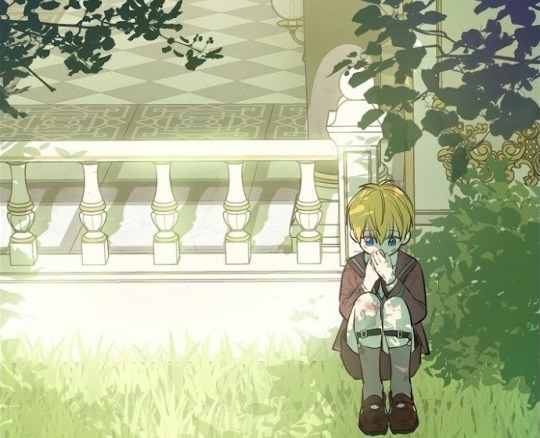
Ah before I forget too much brown can also create feelings of sadness, isolation and loneliness...alright, you get what I mean, I stop here.
Now to Anastacius. While Claude’s attire is more lowkey about it’s violent origin: Anastacius’ is more upfront. He’s already aware of the situation he is in. He knows his little brother is more talented than him and feels threatened enough to consider the words of Caracks who tried to lure him away. Anastacius wears something resembling a mix of military uniform and a victorian play suit in blue and red.
Blue was also considered the most prestigious colour, and was granted to “royal” regiments.
I think Anastacius and Claude’s outfits were meant to show that they were at a crossroad in life. When Ana was still friendly with Claude he started out wearing play outfits and then as his relationship with Anastacius deteriorated, gradually started to wear normal suits and uniforms until he was wearing his ceremonial military uniform at the day he killed Ana.

The Obelia brother’s wearing a military uniform signifies that they are at war with someone. They are ready to spill blood. You can see it in The Lovely Princess, where when Athy meets Claude for the first time, instead of a toga he is wearing a military uniform and continues to do so almost until his death. We know that Diana was the one who introduced him to Siodonna’s fashion. With the memories of her gone, so was the peaceful presence in his life and he became a misanthrope. The memory spell had taken full affect and he was incapable to love or care for Athy in any way. Athy became his biggest torment, his enemy. Similarly our! Claude is only wearing a military uniform at official occations like Athy’s debutante ball, where he had to face the nobles which he resented so much. And even now, in the latest chapters he bothered to change his clothes with magic from a toga into a uniform when he reunited with his elder brother.
Whenever Anastacius and Claude are wearing a military uniform they are meeting someone hated (LP verse Claude met Athy, birthday baquet! Claude met the nobles (Roger), and now in chapter 109 he met his brother who had tried to kill him), they either want to demonstrate strenght (the uniform at Athy’s birthday baquet was more show) or they are ready to attack (the uniform in the recent chapters was more practical to move in).
However they are also stress on the fact that they belong to the royal family and are ought to be respected.
Ana wore almost constantly military uniforms, because he felt the need to show that he was the heir. Not only by birthright, but also in appearance. Only when he went undercover he switched his wardrobe to suits (still, in purple in the color of royality) and puffy shirts. You can see it when Anastacius entered the palace with Jennette. When Ana is fighting against Claude he is either wearing a royal blue (past) or a combination of red and black (present).
“ Black and red. In western culture, these are the two most sinister colors, as red typically conveys the meaning of blood or anger, and black is that of darkness or death. Being a very visually striking combination, they can also convey a sense of power. Together, they additionally give the impression of burning coal or wood, i.e. "fire and destruction".”
(TV Tropes: Red and Black and Evil All Over)
In his previous life he bought fire and destruction upon Obelia...like in Athy’s nightmare remember? So it’s is kind of a bad omen as well.

Anastacius uniform in black and red forms a strong contrast to Claude’s uniform, which is dyed in colors of purple and pure white. “The color purple is often associated with royalty, nobility, luxury, power, and ambition. Purple also represents meanings of wealth, extravagance, creativity, wisdom, dignity, grandeur, devotion, peace, pride, mystery, independence, and magic.”
My point is that Ana’s appearance reflect his state of mind. Being all the time at war with his brother. The paranoia to get overthrown. The fear not to be enought. He insisted on wearing the ceremonial royal uniform, the crown and the coat, in royal colors, because he felt inferior towards Claude and it made him feel safer. If he thought his own skills as heir were lacking he sought to compensate with the way he presented himself in public (his inferiority complex might have contributed to his lavish livestyle and tendency to waste money).
The only exception where Ana is not wearing a uniform is a scene during the time of Ana and Claude’s falling out. But he still emphasizes that he belongs to the Imperial family in another way: The brooch on his vest, has the same blue shade as the color of his eyes, which are a trademark sign that only the Imperial family possesses. In chapter 109, Claude and Athy chose to wear a similary colored brooch to show that they are the “true” heirs.
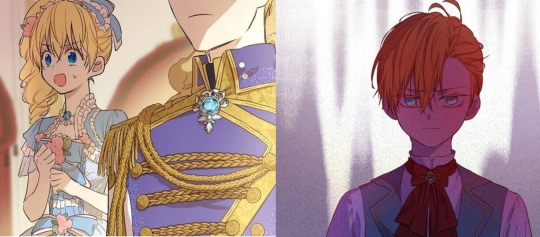
#does this make sense#I'm tired#anon#answered asks#wmmap outfits#wmmap#who made me a princess#sbapod#suddenly became a princess one day
76 notes
·
View notes
Note
What’s interesting about their fangs too is that it’s the actual enamel of the teeth growing and sharpening, rather than already sharp teeth dropping lower from the gums to lengthen them. In Lestat, the change seems almost subtle (which is kinda hilarious since in all other ways he’s the least subtle guy ever), while in Louis, the change is very dramatic. His fangs appear much longer and, at least in the clip above, appear to curve slightly backward- if Lestat’s fangs can be compared to a cat, Louis’ are almost snake-like. Claudia’s are very similar to Lestat’s in terms of shape, again highlighting their similarities. Now, some people might go “Why would Louis have snake-like fangs? Snakes/reptiles in general are known for being unemotional and Louis is super emotional.”
Hear me out- giving Louis snake-like fangs actually makes a lot of sense. For one, it firmly connects him to New Orleans, Louisiana, his hometown. Google Louisiana snakes and, wow, there are a lot. His imagery is also deeply connected to nature (greens, browns, earth tones). That’s not to say he’s always in those colours, but when he veers from them it stands out (for instance, Louis’ red suits are worn when he’s trying to immerse himself in human affairs, he’s not being entirely himself. Similarly, his all black outfits in Dubai sharply contrast with his past/own aesthetic, instead seeming borrowed from Armand). Louis is often shown most comfortable surrounded by nature- he opens up to Claudia while rowing a boat for her on the Bayou, he lets down his guard for Jonah on a walk through the forest, he goes to parks or trees when he’s feeling overwhelmed/in need of comfort.
Now, I know what you’re thinking “But personality wise!?! Louis’s so sensitive and reptiles-” Sshh. Maybe it’s the proud mother-of-two-pet-geckos in me, but reptiles get a bad rap as far as the emotional thing goes. They aren’t showy in their affections the way mammals like cats are (ahem remember our cat-like friends Lestat and Claudia? Demanding of attention, easily made jealous of each other, quick to scratch and hiss, trying to be aloof but wanting to be constantly close and touched by their favourite person *Louis*), but instead show affection by letting their guard down and allowing people close. On the opposite end, reptiles are slow to anger, but once pushed too far, the result is devastating. Think of how Louis lets people like Fenwick walk all over him, keeping his cool, until he finally snaps and just demolishes the guy. That’s a rattlesnake strike, a crocodile death-roll, that’s a ripping off a guy’s jaw like he’s opening an envelope because he’s hungry and overwhelmed.
With all this in mind, I’m very, very, very curious to see Armand’s fangs. Personally, I hope they go snake fangs with him, because I think that somewhat reptilian personality suits Armand like it does Louis, possibly even more so. In a way, I think that’s at least partly why they connect so easily. Then again, I could also see them trying a completely different style of fang for him or even multiple fangs (as in more than just the canines are sharp). We’ll have to wait and see.
do you like film fangs or show fangs more?
From sheer visuals I like the movie fangs better.
However, I do get why they went a different way here, Brad Pitt really didn’t manage to speak with them too well imho. I believe Rolin mentioned that being a factor and why they’re not longer, too.
And the dropping of fangs is also something extremely… captivating, as it means so much for them.
It’s the dropping of a facade, allowing the hunter to come out, the beast, and it goes extremely well with the dilating pupils. I love how they did it tbh.

I also love that their fangs are different for the characters…
Lestat of course looks almost feral, somewhat cat-like… Louis‘ fangs are a stark contrast imo, indicative of him letting go…

…. while Claudia’s are almost cute.

Well. Almost.😅
I cannot wait to see Armand’s tbh 😈 And Fareed‘s, and Daniel‘s (later) and and and 😅
#vampire fangs#louis de pointe du lac#lestat de lioncourt#snake fangs vs. cat fangs#interview with the vampire#Gilda goes on a tangent
215 notes
·
View notes
Text
This is why men who say “rich women can get abortions” should be told to shut up. A rich woman in a red state suffering from a pregnancy related emergency is still in danger.
Some politicians say rich women will maintain access to abortions, even in states where they're banned.
But where abortion is restricted, even wealth won't be able to protect patients from emergencies.
One in 50 pregnancies is ectopic and requires abortion to save the life of the mother, regardless of finances.
As five states implement near-total abortion bans following the fall of Roe v. Wade, politicians and abortion advocates argue the bans disproportionately impact low-income women and suggest wealthy people will be able to skirt restrictions with ease.
"If an extremist Supreme Court overturns Roe, wealthy women will still get safe abortions — by traveling to another state or country," Democratic Senator Elizabeth Warren tweeted in May. "But women of color, those with lower-incomes, and victims of abuse will suffer the most. Congress must eliminate the filibuster and protect Roe."
While abortion will be easier to access for those with the funds to travel across state lines or ship medication across the country, even the rich will not be protected against medical emergencies that require abortion and are being limited in states like Missouri and Arkansas.
The statutory language in the Missouri abortion ban, for example, is "incredibly narrow," Lisa Larson-Bunnell, a Kansas City area health care regulatory attorney, told the St. Louis Post-Dispatch, and has doctors worried that they won't be legally able to intervene in a medical emergency requiring an abortion until a pregnant woman is close to certain death.
"This is a really serious issue," Larson-Bunnell told the St. Louis Post-Dispatch. "This is something that physicians and attorneys all throughout the state are trying to wrap their minds around."
Ectopic pregnancies, which occur when a fertilized egg implants outside the uterus, are a leading cause of maternal mortality in the first trimester. Nearly 2% of pregnancies — or 1 in 50 — are ectopic, according to statistics published by American Family Physician and in virtually all cases, the embryo will not survive past the first trimester. Such pregnancies are emergencies that require an abortion to save the life of the mother and delaying treatment may result in sepsis or other internal infection and death.
Similarly, placental abruptions are a time-sensitive medical emergency wherein the placenta separates from the wall of the uterus before birth. To avoid extensive bleeding, kidney failure, and possible death, medical treatment — sometimes including abortion — must be administered immediately.
Regardless of the wealth of a patient or their ability to finance an out-of-state trip for an abortion, such medical emergencies will impact women across the country. And, as physicians are required to navigate the legal logistics of determining whether a patient meets the criteria for a medical exemption, the lives of their patients are at significant risk.
"It's very frightening and confusing for physicians and the whole team that cares for patients to know, what can we do, what is OK and what's not OK?" Dr. Lisa Harris, an ob-gyn and professor at the University of Michigan, told NPR.
"How imminent must death be? There are many conditions that people have that when they become pregnant, they're OK in early pregnancy, but as pregnancy progresses, it puts enormous stress on all of the body's organ systems – the heart, the lungs, the kidneys. So they may be fine right now – there's no life-threatening emergency now – but three or four or five months from now, they may have life-threatening consequences."
9 notes
·
View notes
Text
“…War often necessitated the absence of men from their families and their homes. While we have already touched on the fact that women could exercise military leadership during such an absence, the importance of their domestic role in the context of the husbands’ or sons’ military activities is worth considering, even if the women themselves were not all directly involved in military activity. For, in their men-folk’s absence, women sometimes assumed full control over the governance of the household or estate, along with all the lands which came with it – a role which took on an added significance amongst marriages of the more powerful nobles of Western Europe whose landholdings often entailed extensive seigniorial rights.
Stephen of Blois, for instance, alluded to the power that his wife Adela had whilst he was absent on the First Crusade when he wrote that ‘I send [the wish] that you do well and dispose of your things superbly, and treat your sons and your men honorably, as befits you’. This statement reveals the lordly authority which Adela maintained as regent while Stephen was absent and which she was to retain after his early death in May 1102 – right up until she took the veil as a nun in 1120. The military authority she wielded as lord is demonstrated by the fact that she once sent a large number of knights to support her lord Louis VI (c.1081-1137) while he was fighting rebellious castellans north of Paris in 1101.
But Adela was not the only women whose regency resulted from the call to crusade: when Louis IX went on crusade he entrusted the governance of the French kingdom to his mother, Blanche of Castile, who had proven herself a reliable and effective ruler during his minority. Eleanor of Aquitaine (1122-1204), queen of France and later England, similarly acted as regent in England for her son Richard I while he went on crusade, and was involved in mediating ecclesiastical disputes in his absence as well as in matters of governance. Likewise, Clementia of Burgundy, wife of Robert II of Flanders, held his county while he was left on the First Crusade, much like Eremburge of Maine governed the county of Anjou during her husband’s absence on crusade in 1120.
In the Holy Land the wife of Joscelin the Younger, count of Edessa (d. 1159), governed the county ably after he had been taken prisoner in 1150 – ‘far beyond the strength of a woman’, according to William of Tyre. His remark hints at the way in which medieval women who did govern well were thought by their male contemporaries to have transcended the ‘weakness’ of their sex, much like other comments regarding militant women referred to their masculine qualities in order to explain their involvement. Regardless of how well they governed, though, the key point is that it was war that forced these women to assume governing roles at home in support of their husbands or sons.
Women were also sometimes entrusted with the administration and coordination of affairs in preparation for war. Thus in 1267 the earl of Pembroke wrote to his wife, who had command over the castle of Winchester, informing her that he had sent men to help her defend the castle from attack and instructing her that she had ‘power over them all...to ordain and arrange in all things according to that which you shall see to be best to do’. More striking is a letter sent by Edward III in 1335 to three women: Margaret, widow of Edmund, earl of Kent; Marie, wife of Aymer de Valence, earl of Pembroke; and Joan, wife of one Thomas Botetourt.
In this letter Edward, who was absent fighting in Scotland, commanded these women to gather trusted advisors together in London to ‘treat and ordain on the safe custody and secure defence of our realm and people, and on resisting and driving out the foreigners’ who Edward had heard were massing warships and men at sea. The women were then ordered to ‘arm and array your people...to repel powerfully and courageously the presumptuous boldness and malice of our same enemies...if those enemies invade’. Although we do not know the extent to which these women were successful in carrying out the king’s orders, Edward nevertheless showed remarkable faith in the capacity of these women to prepare for the defence of the realm in his absence – certainly no small task.
Another particularly important arena in which women could directly aid the military effort was through their efforts to help finance and raise money for wars within Western Europe and the Holy Land. Funding for military campaigns was raised in many different ways – taxation, general donations, mortgaging or selling property – and women formed an important part of this process, especially when it came to paying for costly crusades to the East. We have already seen how Pope Innocent III, at the turn of the thirteenth century, began to make greater allowances for women to accompany their husbands on crusade or take a crusade vow if they were able to take armed followers with them to the Holy Land, but what really freed up this process was the promulgation of Innocent III’s decretal Quia maior in April 1213 (which pronounced the Fifth Crusade).
Quia maior stipulated regular liturgical processions of men and women, during which the participants would hear sermons, receive some degree of remission of sins just for listening (according to an earlier letter of Innocent), and pray for God to deliver the Holy Land. Furthermore, it promoted greater financial participation by making it possible for women to finance male warriors to go in their place and also specified monthly Church collections to which men and women could contribute. Perhaps most importantly, Quia maior decreed that anyone of either sex who so chose could take a crusade vow and might redeem or commute it if necessary (in return for a monetary payment), thus widening the number of people who might contribute financially to the crusade movement.
Later papal policy expanded this practise by enforcing the payment of vow redemptions if crucesignati (the legal term used to signify someone who had taken a vow) did not leave on crusade. As far as women are concerned there seems to be not enough evidence to gauge how much they actually contributed to the overall amount of money collected from redemptions, or even how much was collected in the first place. Nevertheless, Innocent’s reforms certainly allowed women to take on a greater financial and spiritual role in supporting the crusades, even if their circumstances prevented them from going on crusade in person.
Vow redemptions were, however, only one means by which women could provide monetary assistance. Often more financially taxing were instances in which women were forced to sell their husbands’ property or mortgage dower lands, which left some destitute and others fighting in the courts for their property rights, as Christopher Tyerman has explored in the case of English women. At other times, women helped contribute funds collectively, especially in the case of poorer crusaders who had to rely more on donations from the whole family, in which case the selling and mortgaging of property was again the most common way of financing a family member for war.
Similarly, women who had control over a significant source of income could play a key role in helping finance men on crusade: Hodgson, for instance, cites the examples of Marie of Champagne and Blanche of Castile, both of whom acted as regents and sent money to their sons while they were crusading in the Holy Land, but has also noted other women whose large dower was a key financial source for crusade expeditions. Another more indirect means by which women could assist the continuing military struggle in the Holy Land came from the revenues of female convents associated with the recently founded military orders, of which part went towards financing the latter’s activities in the East (although these payments were not large and varied from one house to another depending on each convent’s financial means).
Finally, we cannot discount the role female taxpayers may have had in helping pay for war, although again it is very difficult to discern how much women contributed in this regard, since the head of the household (the eldest male) was the one who paid taxes and who thus appeared in tax records. The only women to appear were those active in an independent trade of their own or who were widowed and lived in a house in which no male heirs were also residing, though such women only seem to have made up a small proportion of taxpayers.
Thus, even if most or all tax revenue before the sixteenth century went towards financing war, as has been argued in the case of England, the percentage of the revenue that came directly from female taxpayers would have been much less than that of male taxpayers (though both sexes were adversely affected by the effects of high taxation in times of war). Considering all of the means by which women could contribute financially, therefore, it is reasonable to assume that Western European women were a substantial source of finances for military campaigns, especially for the crusades, although the precise extent to which this assistance actually contributed towards the success of these campaigns is hard to quantify.
Women’s enthusiasm for war and their recruitment efforts formed another facet of their home front involvement. This is one area where women may not have always acted in support of their men, and instead actively tried to discourage their men from leaving, hence the actions of such women are worth exploring as they could have influenced the number of men who went to war. The chances of women successfully preventing men’s involvement in warfare appear highest in the case of the crusades because, although wives’ emotional responses to their husbands’ departure could not prevent the latter from leaving, canon law stipulated both husband and wife required each other’s consent before leaving to go on crusade.
Thus women were, for a period, legally able to veto their husbands’ decision to participate. To what extent women were successful at doing so is not entirely clear – some of those who preached the crusade appear to have felt women were among the ones preventing the crusades from being successful, although after Pope Innocent III issued his decretal Ex multa in 1201, which removed the requirement for men to obtain their wives consent before leaving, they would have had little cause for further concern. These developments suggest that some women, at least up until 1201, were successful in stopping men from leaving, but it is hard to say for certain.
Emotional distress at the departure of loved ones on crusade may have played a role though: Odo of Deuil noted that there were tears on the part of women when the Second Crusade departed, as did Ambroise before the Third Crusade. Some years earlier Fulcher of Chartres elaborated at greater length on the sorrow before the First Crusade: ‘Oh what grief there was! What sighs, what weeping, what lamentation among friends when husband left his wife so dear to him, his children, his possessions however great...Then husband told wife the time he expected to return...He commended her to the Lord, kissed her lingeringly, and promised her as she wept that he would return.’
Departure scenes such as this one, it has been argued, were deliberately used by chroniclers to portray the crusades as a male affair in which women were not expected to participate. Certainly, such an account does reinforce conventional gender stereotypes: the emotionally controlled, pious husband, and the overwhelmed, irrational wife unable to maintain her composure. Nevertheless, it is not unreasonable to assume that some women would have been reluctant for their men to depart and upset if the latter eventually did, although we cannot know the extent of their influence on limiting the numbers of men on crusade.
At the same time, medieval women also seem to have encouraged and even recruited men for war. Thus the author of the Itinerarium Peregrinorum asserted that ‘Brides urged their husbands and mothers incited their sons to go, their only sorrow being that they were not able to set out with them because of the weakness of their sex’. Although gender stereotyping is again evident in the way women’s ‘weakness of sex’ is said to have prevented them from leaving, there are some actual examples of women who tried to persuade men to fight. Adela of Blois, for instance, is well-known for her efforts to persuade her husband Stephen to return to the Holy Land after he deserted and came home during the difficult siege of Antioch in 1098.
Similarly, Alice de Montfort was active in recruiting men, notably her brother (the Constable of France) during the Albigensian crusade, as was, supposedly, Eleanor of Aquitaine before the Second Crusade. Riley-Smith, too, has also discussed women, notably the Montlhéry sisters in the Île-de-France, whom he feels ‘transmitted an enthusiasm for crusading to the families into which they married’ and which can help ‘account for the concentrations of crusaders in certain kindred’ during the early crusades. Of course, whilst the genealogical preponderance of crusaders in certain families does not prove for certain that women necessarily had anything to do with recruiting or persuading men to fight, the examples given above do suggest that we should not discount their possible influence.
Lastly, it is also worth considering the role which urban women active in certain trades had in supplying various resources used in military affairs. For although most women were active in the textile and cloth-making industries during the Middle Ages, there were apparently some who worked sharpening tools and making scabbards for swords and knives, and others who even trained in arms manufacture (making chain mail and fletching strings to bows) – definitely a trade that would have thrived on war. Admittedly, the numbers of women engaged in such crafts were very few and their likely effect on military affairs slight. Accordingly, we should not make too much of their employment or we risk over-emphasising their contribution. All the same, they do at least serve to draw attention to other more indirect means by which women on the ‘home front’ may have supported the whole industry of war by supplying military goods and services.
- James Michael Illston, ‘An Entirely Masculine Activity’? Women and War in the High and Late Middle Ages Reconsidered
#james michael illston#military#crusades#history#high middle ages#late middle ages#noblewomen#medieval
52 notes
·
View notes
Text
My Harvest Moon/Story of Seasons Headcanon
(will probably get updated as I go)
This is mostly just for fun 😅
Doctor Trent is the oldest bachelor in Mineral Town. He’s a fully qualified doctor, so he’s done at least 8 years of medical school. Assuming he didn’t graduate early, that makes him at least 26. But he’s also an experienced doctor, not a newly qualified medic, so I place his age at around 30.
Due to the experience of losing both her parents at a young age, as well as having to raise her young brother and look after her sick grandmother, Elli is more experienced and mature than most other girls her age.
“UMA” is either a clothing brand, a sports team or a university acronym that Gray especially likes. I personally like the idea of the sports team best: I can totally see Gray as someone who follows a particular team religiously. (I know “UMA” means ‘Horse’ in Japanese, I just like this idea)
Lyla and Louis from StH/MM are Lillia’s parents and Popuri and Rick’s maternal grandparents. Lillia and Popuri inherited Lyla’s pink hair and love of flowers, Lillia got her mother’s eyes, and Rick took after his grandfather Louis in looks, although he got his hair colour from his father, Rod.
Similarly, Gwen and Bob are Zack’s parents. Zack took after his father in physical appearance, but got his mother’s lighter hair colour.
Murray (AWL) is not human – he’s actually some form of mountain dwarf/oni who for one reason or another got separated from his people in Po Po Valley and ended up in Forget-Me-Not. Because he’s not human, he’s not affected by the cold as much, hence why he doesn’t freeze to death in Winter wearing only his grass skirt. (There are plenty of other mythical creatures in the franchise, like Kappas and mermaids, so why not?)
Old Nina (AWL) is the elderly version of Nina (SNES), just like old Ellen (HM64) is generally considered to be the elderly version of Ellen(SNES).
#Harvest Moon/Story of Seasons Headcanon#Doctor Trent#Elli | Elly#Gray#Lyla#Louis#Lillia#Popuri#Rick#Gwen#Bob#Zack#Murray | Moi#Nina#Ellen
18 notes
·
View notes
Photo







Sophie of Rostock Characters: The Rostock Family
A Little Background on the Rostock Family: The Rostock Family has been a noble family in the Wardenburg Region since 1506. They were once a rich powerful family until the 1730s, when Adolphus 13th Prince of Rostock joined in the coalition against the King of Wardenburg, who was trying to reunite the country. Adolphus lost majority of the family fortune fighting in a war against the King of Wardenburg. The current reigning Prince of Rostock is His Serene Highness Prince Joseph Frederick II, 15th Prince of Rostock, he has no children but has been married to Princess Louise of Vasa for 30 years, his heir is his nephew HSH Prince Gustaf of Rostock, 22 year old son of his brother the late Prince Heinrich.
First Character: Her Serene Highness Princess Sophie Julianne Frederike of Rostock
Born in 1792, she is the eldest daughter of her parents HSH Prince Heinrich of Rostock and HRH Princess Viktoria of Norden Princess Heinrich of Rostock. She is also the twin sister of HSH Prince Louis Frederick. Sophie was a delight to her father when she was born, she was always his favorite. Sophie was always a bright girl, she learnt all of the languages of the SImtenent and read every piece of literature at the Castle’s library. Her father was stationed in Brunsfield near the North Sea in 1795, and so her family followed. She moved from Schloss Rostock at her uncle’s small court to the lonely city of Brunsfield. She lived at a fortified castle with her siblings and mother. Her mother, Viktoria was always cold to her, she wanted more from her and expected the best. Sophie was closest to her twin Louis Frederick and was jealous of her sister Maria Gisela who was her mother’s favorite. While in Brunsfield in 1806 she fell in love with a soldier who’s father was his officer. Her father sent Sophie to her grandmother, the Dowager Duchess of Norden’s court in Graz. Once her father died in 1807, her and her family returned home to Schloss Rostock. For the past two years, Sophie has been preparing for marriage and has been meeting suitors. She is yet to come out to court in Wardenburg, but with her mother’s wealthy and influential relatives she will be sure to catch someone.
Second Character: HRH Princess Viktoria of Norden, Dowager Princess Heinrich of Rostock
Princess Viktoria was born in 1768 to the reigning Duke and Duchess of Norden, her grandfather had been the King of Vasa and her grandmother a Grand Princess of Weimar. She had come form a powerful and influential family with relatives from all over the continent and in very powerful courts. Viktoria was her parent’s youngest, and the 6th daughter. She ended up marrying last and her parents chose HSH Prince Heinrich of Rostock who was far below her station. The Court was shocked once it was heard that Viktoria had stooped so low compared to the rest of her family which the reason is still not known. Her marriage with Prince Heinrich was quite happy but she was never in love with him. She had 10 children with him, and only 4 survived childhood. Her first surviving child, Prince Gustaf was born in 1788, 6 years after they had married. Rumor was that Heinrich was going to divorce Viktoria because his mistress had gotten pregnant before she had. Viktoria hated life in Brunsfield, she was a social girl who grew up in a massive court and disliked the lonely life there. Once her husband died she was quite relieved to return back to Schloss Rostock. She always expected the best from her children, especially Sophie whom she saw as the ticket from her life as a minor Wardenburgian Princess. She has been preparing Sophie for marriage for the past few years, and her entire life to be honest.
Third Character: HSH Princess Maria Gisela of Rostock
Princess Maria Gisela is the youngest of the Rostock siblings. She was born in 1794 in Brunsfield Castle. Maria Gisela has had a much more relaxed life compared to her sister. As she is the youngest she is not expected to marry for at least another two or three years and enjoys having lots of time before worrying about that. Maria Gisela like her sister also fell in love with a soldier, General Rudolf St.Josephs and it has been rumored she has slept with him, essentially ruining her reputation in Brunsfield but it had been covered up by Viktoria. Maria Gisela enjoys going on horse rides and enjoys the ballet in Rostock.
Fourth Character: HSH Prince Gustaf of Rostock
Prince Gustaf was born in 1788, the first surviving child of his parents. He spent his younger years at Schloss Rostock under the care of his governess and later many tutors. Gustaf stayed with his uncle at Schloss Rostock while the rest of his family moved to Brunsfield. He has been raised as the heir of Rostock by his uncle and aunt who acted as his foster parents. In 1802, he joined his parents and family at Brunsfield where he lived until his father died. He did military training there where his father was a general. Once his father had died, he took responsibility for his family. He took control of the family’s finance and made the decision to go back to Schloss Rostock. In 1808, Prince Gustaf accompanied his second cousin Crown Prince Carl of Vasa on his journey to find a bride. The Crown Prince chose Princess Amelie of Cologne to be his wife. Meanwhile Prince Gustaf became engaged to Princess Elisabeth of Bremen in December.
Fifth Character: Prince Louis Frederick of Rostock
Prince Louis Frederick is the twin of Princess Sophie, and was born in 1792. Similarly to Prince Gustaf, he was taught by tutors in Brunsfield and trained to be a soldier. Since his father’s death, he has been going to college at Bremen. Louis Frederick is known as the “brains” of the family and has been studying for quite some years. While his brother was the “soldier” he has been the “philosopher” of the family. He has always been more concerned with academics and has bonded with his sister Sophie over literature.
Sixth Character: HRH Princess Helene of Vasa, Dowager Duchess of Norden
Born into the powerful Vasa Royal Family which controls the Northern Sea, she was seen as a powerful political figure. As she was the only daughter of the King of Vasa, she had married the Duke of Norden, nephew of the King of Wardenburg and son of the Grand Princess of Weimar who held major political ties to foreign countries. Her marriage cemented an alliance between the two countries and settled that Vasa controlled the Northern Sea. She is a very traditional and old fashioned woman, she grew up in a Royal Court and is extremely well versed in Court Manor. Since her husband died she has become the leading lady at the Norden Court. Most of her children married incredibly well, marrying Archdukes, HRH’s, Princes/Princesses, and Grand Princes. Viktoria was incredibly disappointed in the choice she had made for her daughter Viktoria, and has been financially supporting her family for the past few years. Viktoria now hopes to fix her mistake with Viktoria by marrying her granddaughter Sophie to a powerful family. She has given up hope for Maria Gisela and has already had a small victory for Gustaf’s engagement.
anyway so these are going to be the main characters for the majority of part one! There will be more main characters but I do not want to give them away because it would be a spoiler! So the story will begin in April of 1809!
#SophieOfRostock#sim4#sims#story#ts4 story#s4 story#sims 4 historical#history#s4 history#sims 4 regency#ts4 regency#sims 4 story#sims 4 history#ts4 history#sims 4 regency story#s4 regency#ts4#s4#sims 4
56 notes
·
View notes